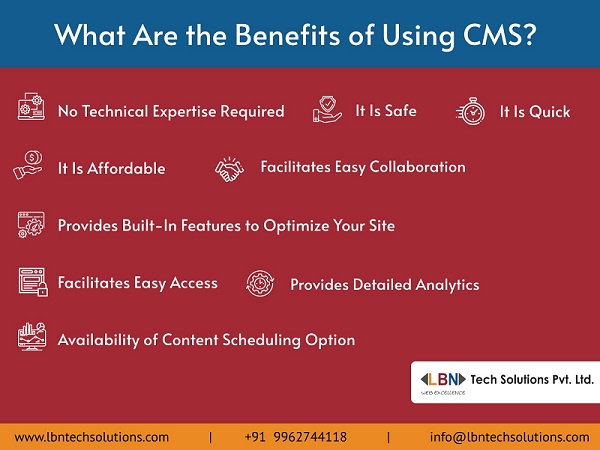What Is CMS and How Can It Be Used in Website Development?

Table of Contents
- What Is CMS
- CMS – A Digital Architect’s Easy Toolbox
- What Can You Do with CMS?
- What Are the Benefits of Using CMS?
- Conclusion
Do you want to build a website? Does your limited technical knowledge make you hesitate? No worries! CMS can save your day!
Content Management System (CMS) refers to a software platform that helps its users build, design or maintain websites even if they don’t know a thing about coding. CMS website development platforms are quite popular now, with almost 60% of all websites using at least one of these platforms. Read more to understand how CMS has become the cornerstone of modern website development.
CMS – A Digital Architect’s Easy Toolbox
One thing that has helped CMS platforms become a huge success is their user-friendly interface. We aren’t all great programmers but most of us can handle the simplified version and CMS provides exactly that.
Some people might confuse websites with CMS. A website is a collection of web pages and it can be created even without the use of a CMS. Content Management System is a software that allows you to create and manage webpages. Building a website through CMS is easier than building a website from scratch through coding.
Also Read: How to Market Using Social Media for Different Generations
What Can You Do with CMS?
- Create and format content
- Customize the design and functionality of your website
- Store content in one place
- Manage content based on roles like authors, admins and more
- Manage when and where you can publish the content
- Improve your digital experience through optimization
What Are the Benefits of Using CMS?
CMS platforms offer several benefits that have made them a star when it comes to website development. Here are some reasons why you should consider using CMS for developing your website.
No Technical Expertise Required
Coding is a major part of website development but CMS allows you to do it all without the help of web developers or designers.
You can now choose from the different templates present and install plugins for the functionality of the site. You can fully control what happens on your website and how it looks even if you are a non-developer.
If you aren’t very impressed with the options available in CMS, most platforms let you add codes of your choice to achieve better customization.
It Is Safe
Content management system platforms have built-in features to safeguard your site. There are also add-ons that you can use for better security of your site.
It Is Quick
The predesigned templates that are offered on the CMS platforms can ensure quick customization of your site. You just have to select the template that you think will look and work the best. If you don’t like the result, you can simply choose another.
The templates that you choose affect the performance of the website. Make sure to choose responsive templates.
It Is Affordable
Maintaining a static website can soon turn expensive. Along with that, include the cost of hiring a website developer or designer and factor in the waiting time.
With CMS systems, you don’t have to hire website designers for minor site changes since you can do them yourself. Hence, CMS systems save you money as well as time.
Facilitates Easy Collaboration
Multiple users can access the system and work on it simultaneously. There is a lot that goes into running a website successfully. This collaborative nature of the CMS platform helps improve workflow and productivity. It also saves a lot of time since multiple people could be working on the same landing page at the same time.
Provides Built-In Features to Optimize Your Site
Optimising your site for search engines can be a breeze with CMS platforms. There are built-in tools for the job but you can also use third-party tools to perform functions like optimising page load times, adding image alt text and more.
Facilitates Easy Access
Building a site from scratch requires you to use a device that is connected to a server or has a remote connection. The CMS platform however can be accessed on any device, provided you have an internet connection.
As mentioned earlier, the user-friendly interface makes it easier to work on the platforms even if you are not a tech wizard.
CMS systems are also mobile-friendly provided the plug-ins and themes you choose are compatible with mobile devices.
Also Read: Top 5 Reasons Why Your Business Needs a Website in 2023
Availability of Content Scheduling Option
Most CMS platforms provide built-in blogging options that make it easy for the user to create and publish blogs. You also have the option of scheduling your content. With the press of a button, you can control when your content or blog posts go live.
Provides Detailed Analytics
Content Management Systems integrate well with almost all the popular analytical tools. Some CMS systems also come with their analytics and reporting tools.
The detailed analytics provided by the tools can help monitor your campaign to understand what is working and what isn’t. With this data, you can get to know what type of content performs and which platforms you can use to gain the best results.
LBN Tech Solutions
Creating a website has become an easy job with CMS platforms. But what makes a website convert? The details. We at LBN Tech Solutions, take the time to consider every small detail that plays a critical role in converting your website visitors into customers. Check out our portfolio here to understand what we can do for you.
- Feb 15, 2024
